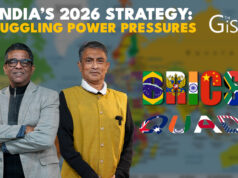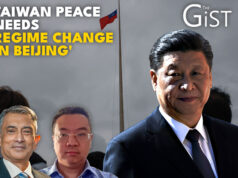Mr Rudd says “those who have designed the Quad in Washington, Tokyo, Delhi and Canberra have been quite clever about this, because they’ve designed it as an elastic instrument. It can be extended in different directions. Right now, it’s a political summit mechanism. It’s a vehicle for foreign policy coordination. It’s also about to become increasingly a vehicle for coordination of policy, on the economy, on technology, even on climate. I was talking to the Australian climate minister the other day, who told me he’s about to have the Quad climate ministers meet. But, it’s not yet a military arrangement, (though) we do have (naval exercise) Malabar involving four Quad partners. So I suspect the strategic logic of the Quad is one which could be expanded over time. Vertically or horizontally, depending on how China’s own strategic behaviour unfolds. So from China’s own strategic calculus point of view, the emergence of the Quad is a new factor in the overall geostrategic equation. I think Beijing has been surprised that the four of us could actually agree to work with each other. I think that assumes that we are so different. Japanese, Australians, Indians, and Americans. Only two of us play cricket. They’ve moved from surprise and derision to concern and at least diplomatic attack, which is currently where the nature of the business lies”.
Watch this comprehensive interview with Kevin Rudd for his “practical recommendations on how to avoid a catastrophic conflict for everybody, not just for the Chinese and the Americans”, how both he and 99-year-old Henry Kissinger are worried about the real risk of conflict, territorial aggression including on the LAC in Ladakh, how Xi Jinping is “the first Chinese political leader to make it clear that for great national rejuvenation to occur, it can only occur with the reintegration of Taiwan”, Xi’s “pattern of behaviour, which is to assert, to act to change the situation on the ground, to consolidate, to rest and then to assert again”, whether the Chinese Communist Party run state was surprised by pushback across the globe, the logic of taking on so many different fronts at the same time, how Prime Minister Modi is not Pandit Jawaharlal Nehru and 2022 is not 1962, the risk of “conflict and war by accident. That is by incident as opposed to conscious design”, whether PLA commanders will tell Xi Jinping that “taking Taiwan militarily is too risky”, whether the Chinese people will be willing to sacrifice their children in war, how India will “calibrate its actions within the Quad”, Delhi’s Taiwan and Tibet policies, the Russia-China ‘no limit partnership’ and the China-Pakistan ‘all-weather alliance’, the BRI, CPEC and Afghanistan and Xi Jinping’s “real Achilles heel”—the slowing Chinese economy.




